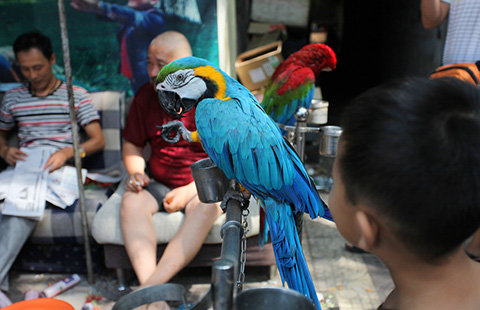

Exclusive supplier offers 2,012 designs with strong local flavor
The growth of Beijing Huajiang Culture Development Co Ltd, also known as Honav, is inextricably linked with the Olympics.
Established in 2003, Honav is a company that combines research, design, manufacturing and retail on an international scale.
It rose to fame in the industry with its souvenir of the Bird's Nest, which was produced from the leftover steel from the construction of the main stadium of the Beijing 2008 Olympics.
This was just the beginning of Honav's successful relationship with the world's biggest sports event. In 2008, after beating 42 competitors, the Beijing-based cultural and creative enterprise won the exclusive license to make badges for the 2012 London Olympic Games.
The right to produce and sell badges for the Olympics is usually shared, but Honav gained the exclusive license to produce and retail the badges thanks to its unique understanding of the London Olympics and its creative designs.
In order to give its badges' designs more of a local feel, Honav designers were sent to London to experience life there. Some stayed for several months, with some living in the city for more than a year.
Finally, 2,012 badge designs were recognized by the London Organising Committee of the Olympic Games and Paralympic Games, including the landmarks of the 33 London boroughs, a traditional English breakfast and Wellington boots.
The London Olympic badges began to be sold in Beijing in August, and in addition, all licensed products for the upcoming Olympic Games, including key chains and mascots will be sold in China.
"This is the first time for a large-scale sale of Olympic licensed products in a market outside the host country and where the International Olympic Committee is headquartered," said Honav President Chen Shaoshu.
In terms of the sales of the badges, Ruan Wei, a researcher at the Institute for Cultural Industries at Peking University, who specializes in sports industry marketing, said that the sales of London Olympic badges in China will be poorer than in London, because local people will develop more cultural and emotional connections with the souvenirs.
Honav's success in the overseas market provides a good example for Chinese cultural companies, especially as the central government is encouraging domestic cultural enterprises' expansion in the global market.
"The primary difficulty that a Chinese cultural enterprise has to overcome when launching an overseas expansion is a failure to understand the local market," said Xiao Yongliang, executive director of the Institute of Cultural and Creative Industry at Beijing Normal University.
Similar companies in China could learn from the measures Honav has taken to establish its brand, Xiao said.
huangying@chinadaily.com.cn
 Audi's new S7 Sportback and A7 family
Audi's new S7 Sportback and A7 family
 A million dollar lunch with billionaire Warren Buffett
A million dollar lunch with billionaire Warren Buffett
 Bird market hidden in Xi’an ancient street
Bird market hidden in Xi’an ancient street
 Top 10 richest Chinese tech giants
Top 10 richest Chinese tech giants
 Bigger iPad announced at Apple 'monster' event
Bigger iPad announced at Apple 'monster' event
 Top 10 highly-paid jobs for single people
Top 10 highly-paid jobs for single people
 Robots sparkle at Summer Davos Forum in Dalian
Robots sparkle at Summer Davos Forum in Dalian
 New Jaguar to take on Mercedes, BMW as it rolls out in China
New Jaguar to take on Mercedes, BMW as it rolls out in China